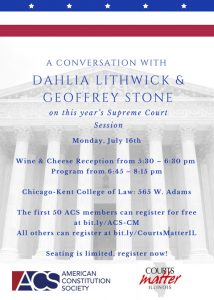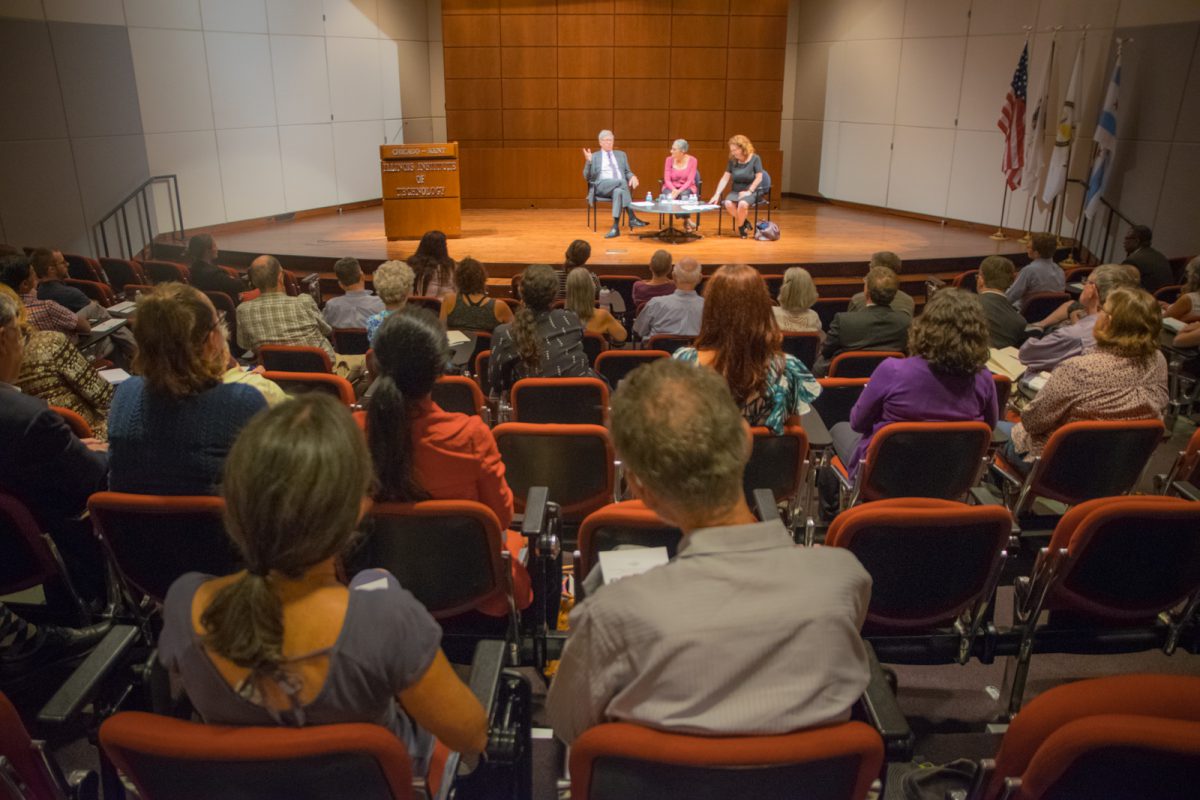 On July 16, the American Constitution Society and Courts Matter Illinois co-hosted an event at Chicago-Kent featuring a discussion with Dahlia Lithwick of Slate.com and Professor Geoffrey Stone of the University of Chicago on recent Supreme Court rulings.
On July 16, the American Constitution Society and Courts Matter Illinois co-hosted an event at Chicago-Kent featuring a discussion with Dahlia Lithwick of Slate.com and Professor Geoffrey Stone of the University of Chicago on recent Supreme Court rulings.
The event began with opening statements to offer context on the significance of the Supreme Court and the political trends they’ve seen in the current court.
The event continued with discussion of six key cases, followed by an open question and answer section that included discussion of SCOTUS nominee Brett Kavanaugh and the implications of recent cases on other free speech and immigration issues.
You can find the full video of the event below, along with an outline of the cases they discussed and quotes from the live Twitter coverage of the event.
Video:
Opening Statements
Staff from Courts Matter Illinois opened the event by thanking all of the students and organizations that helped make the event happen and by introducing the speakers.
Dahlia Lithwick began by remarking on the changing characteristics of the court, on the movement from swing justices to a reliably conservative majority determining cases.
.@Dahlialithwick: one of the overarching themes of the terms was the weaponization of free speech
— ACS Students (@ACSstudents) July 17, 2018
Professor Stone described his perspective on the Supreme Court — starting with watching the Warren Court in the late 1960s when he began law school — as an institution that was a champion of democracy, free speech, and the fundamental values of the Constitution.
When @stone_geoffrey was clerking on #SCOTUS, it was the beginning of the Burger Court, which they thought was an extremely conservative Court. & that was the Court that decided #Roe
— ACS Chapters (@ACSstudents) July 17, 2018
He described the increasing political polarization and said he worries that it will become a threat to the credibility of the institution.
2018 Supreme Court Cases:
Case 1: Masterpiece Cakeshop, Ltd. v. Colorado Civil Rights Commission
- WATCH – skip to this discussion in the video: 16:57
Beginning with @stone_geoffrey discussing the Masterpiece Cakeshop ruling pic.twitter.com/g8GjyZ2WIA
— Courts Matter IL (@CourtsMatterIL) July 17, 2018
.@Dahlialithwick: and the most consequential part of 2016 was the blocking of Judge Merrick Garland to the #SCOTUS
— ACS Chapters (@ACSstudents) July 17, 2018
“The seven members of the majority basically ducked the issue,” Stone says, pointing out that they may be waiting for a fifth conservative justice to join the court.
— Courts Matter IL (@CourtsMatterIL) July 17, 2018
Case 2: Trump v. Hawaii
- WATCH – skip to this discussion in the video: 24:18
Case 3: National Institute of Family and Life Advocates v. Becerra
- WATCH – skip to this discussion in the video: 34:15
Moving on to National Institute of Family and Life Advocates v. Becerra, Stone explains that it was not an easy case, and one with a stark divide, even if it was technically about free speech (not abortion).
— Courts Matter IL (@CourtsMatterIL) July 17, 2018
On Natl Institute v Becerra, @stone_geoffrey is troubled that the majority opinion is driven by views on abortion, not the fundamental issues before the Court.
— ACS Chapters (@ACSstudents) July 17, 2018
Lithwick adds that this case was very much like Masterpiece in that it was originally argued as a religion case, but #SCOTUS said they would decide it as free speech instead. “We’re crafting a doctrine of speech about religion that gets different rules.”
— Courts Matter IL (@CourtsMatterIL) July 17, 2018
Case 4: Carpenter v. United States
- WATCH – skip to this discussion in the video: 44:04
Now launching into the “only piece of good news,” Carpenter v. United States (addressing digital privacy).
— Courts Matter IL (@CourtsMatterIL) July 17, 2018
Lithwick explains that we have to rethink the Fourth Amendment in the digital age, knowing that your phone tracks your location constantly.
— Courts Matter IL (@CourtsMatterIL) July 17, 2018
What’s a reasonable expectation of privacy? Do you voluntarily give your information to the phone company? This question will continue to evolve over time.
— Courts Matter IL (@CourtsMatterIL) July 17, 2018
Case 5: Janus v. American Federation of State, County, and Municipal Employees, Council 31
- WATCH – skip to this discussion in the video: 51:42
Both Dahlia & Geof note that #Abood which was overturned by #Janus, is as nearly as old of precedent as #Roe.
— ACS Chapters (@ACSstudents) July 17, 2018
Dahlia adds: partisan gerrymandering is a place where #statecourts are stepping up to stop extreme partisan gerrymandering. #CourtsMatter
— ACS Students (@ACSstudents) July 17, 2018
Case 6: Gill v. Whitford
(plus Benisek v. Lamone, Husted v. A. Philip Randolph Institute, and Abbott v. Perez)
- WATCH – skip to this discussion in the video: 56:04
Dahlia adds: partisan gerrymandering is a place where #statecourts are stepping up to stop extreme partisan gerrymandering. #CourtsMatter
— ACS Students (@ACSstudents) July 17, 2018
Lithwick explains that we still have no law of what is a partisan gerrymander, and now that Kennedy is gone, we will see much more of it.
— Courts Matter IL (@CourtsMatterIL) July 17, 2018
Very poignant remark by @Dahlialithwick: the Court in these voting cases combined, tipped their thumb on the scale to preserve minority rule https://t.co/06Bbx7DVJp
— Meghan (@MeghanPaulas) July 17, 2018
Stone calls these cases a deep threat to our democracy, but believes that the judges will likely not address them due to the way they benefit the political party that nominated them.
— Courts Matter IL (@CourtsMatterIL) July 17, 2018
Q&A
Kavanaugh Nomination
- WATCH – skip to this discussion in the video: 1:08:25
Moving to address the Kavanaugh nomination, Stone: In the same way Democrats refused to allow FDR to pack the courts, Republicans need to stop the politicization of the Supreme Court.
— Courts Matter IL (@CourtsMatterIL) July 17, 2018
.@Dahlialithwick: we have a LOT of Kavanaugh's record that shows his view of the unitary executive
— Meghan Paulas (@MeghanPaulas) July 17, 2018
Lithwick points out that the Kavanaugh dealbreaker is a whole host of other cases, specifically those on the executive, executive power, and executive overreach, all of which are incredibly broad.
— Courts Matter IL (@CourtsMatterIL) July 17, 2018
Kavanaugh “went out of his way and went the extra mile” to rule on the side of corporations in his past cases.
— Courts Matter IL (@CourtsMatterIL) July 17, 2018
Additional Questions
Q: Is there an intersection between the overruling of Korematsu in the travel ban case and the inevitable cases that the court will hear on Trump’s family separation policy?
- A: WATCH – skip to this discussion in the video: 1:19:52
Geoffrey Stone: No one believes Korematsu was good law. Part of what made Korematsu so problematic was the internment of U.S. citizens, but that wouldn’t be relevant to the issues with children who aren’t U.S. citizens under the policy now.
Dahlia Lithwick: I don’t think it had any formal salience. The problem that beset Korematsu — that the Justice Department lied — is the same problem in the travel ban case.
Q: Given NIFLA v. Becerra, can OSHA force companies to post safety warnings, or is that an imposition on free speech?
- A: WATCH – skip to this discussion in the video: 1:21:52
Geoffrey Stone: I think if you apply the precedent in a straightforward way, it’s unconstitutional.
Dahlia Lithwick: Justice Breyer, in his dissent, talked about the mandatory scripts for doctors, that if you can’t force a clinic to post information, then doctors can’t be forced to give warnings that have been medically debunked. Where those get struck down, it’s the speech interest of the doctor, not the incidental person who’s carrying a baby.
Q: Can you share any thoughts you have on Kagan’s dissent in Janus and the idea of the conservative justices’ weaponization of the First Amendment?
- A: WATCH – skip to this discussion in the video: 1:24
Geoffrey Stone: I think what Justice Kagan is referring to is the expansion of free speech to include corporations, to deal with labor unions, to apply this argument to extend the conservative goals of their party.
Dahlia Lithwick: I would have said to watch the justices who seemed to move to the center on the issue, but nothing of the sort happened with this issue on the right side of the court. This year the split is with Sotomayor and Ginsburg, who are just bristling with anger, and Kagan and Breyer, who are willing to work with the others.
Conclusion
Megan O’Malley, a founder of Courts Matter Illinois, ended the event with a call to action:
In closing, “we have to be active, we have to pick up the phone.”
— Courts Matter IL (@CourtsMatterIL) July 17, 2018




















